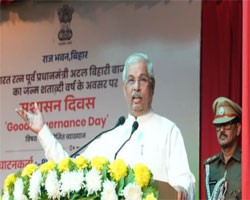Banking Current Affairs
| Appointments and Resigns |
|---|
|
|
|
Event: Rajendra Vishwanath Arlekar was sworn in as the 23rd Governor of Kerala on Thursday.
Venue: The oath-taking ceremony was held at Raj Bhavan, Kerala. Successor: Arlekar succeeded Arif Mohammed Khan, who has been appointed as the Governor of Bihar. Attendees: Kerala Chief Minister Pinarayi Vijayan Cabinet Ministers Senior leaders of various political parties Arrival in Kerala: Arlekar arrived in Kerala’s capital on Wednesday and was welcomed at the international airport by: Chief Minister Pinarayi Vijayan Kerala Assembly Speaker A N Shamseer Ministers K Rajan and Ramachandran Kadannappally Presidential Appointment: Last week, the President of India, Droupadi Murmu, appointed Arif Mohammed Khan as the Governor of Bihar. Rajendra Vishwanath Arlekar was appointed as the Governor of Kerala. |
|
|
|
About Governor Appointment in India
Constitutional Provision: The appointment of Governors is governed by Article 155 and Article 156 of the Indian Constitution. The Governor is the constitutional head of a state. Appointing Authority: The President of India appoints the Governor of a state. The appointment is made on the advice of the Council of Ministers headed by the Prime Minister. Eligibility Criteria: The individual must be a citizen of India. Must have completed 35 years of age. Cannot hold any office of profit during their tenure. Term of Office: The Governor holds office for a term of 5 years but serves at the pleasure of the President. This means the term can be shorter if the President decides to remove the Governor. Dual Role: The Governor acts as the constitutional head of the state. They act as a link between the Union and the State Government. Powers and Responsibilities: Executive Powers: Appoints the Chief Minister and other ministers, advocates general, and State Election Commissioners. Legislative Powers: Summons and dissolves the state legislature, gives assent to bills, and recommends President's Rule. Judicial Powers: Grants pardons, reprieves, or remissions in certain cases. Transfer and Appointment: A Governor may be transferred from one state to another during their tenure. Sometimes, one person is appointed as the Governor for multiple states simultaneously. Recent Trends: Appointments are often influenced by political considerations. Retired civil servants, judges, or politicians are frequently chosen as Governors. Role During Emergency: In case of a constitutional crisis, the Governor can recommend President’s Rule in the state under Article 356. Significance: The Governor ensures that the state government acts according to the provisions of the Constitution. They play a crucial role during transitions of power and crises in the state. |
| >> More Banking Current Affairs |
